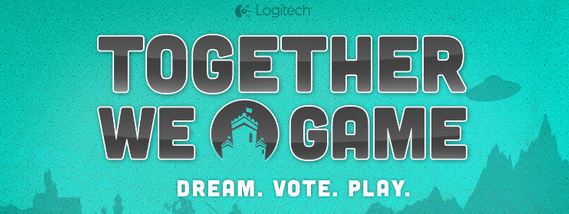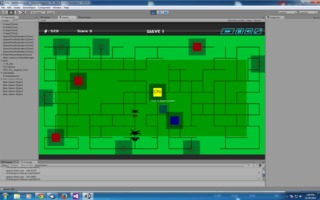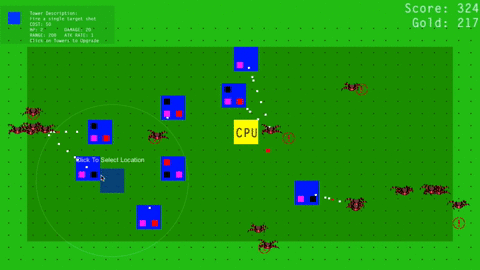Can You Crowdsource A Video Game?
Q&A: Frank Lantz of the NYU Game Center talks about Together We Game, an ambitious, first-of-its-kind game project.

Developers big and small crowdsource ideas for video games all the time, asking fans what new features or gameplay elements they'd like to see in future games. But there's never any guarantee that what fans want will make it into a final product. Developers have final say.
But what if the community of gamers at large was given control of a game's creative direction? With some limitations, this is the idea behind Together We Game, a first-of-its-kind initiative that's seemed to fly completely under the radar since it was announced back in July.

Here's how it works. Though gamers could not choose the genre (it was always going to be a 2D tower defense game due to time and budget concerns), the community was asked to vote on everything else: the game's setting, features, soundtrack, economy, and the name.
Fans chose the name Protocol X57 for the game, and have decided it will include stackable towers, an open field playfield, and feature nanobot enemies, among other things. Voting for the game's sound effects and prop design are still to come, but the game is closing in on its release in January 2015 as a free download for PC and iOS
Together We Game was spearheaded by Logitech, with help from the NYU Game Center Director Frank Lantz, an industry veteran with more than 20 years of experience. The game itself was developed in the uber-popular game engine Unity by Brooklyn-based indie studio Tiny Mantis.
We caught up with Lantz and picked his brain about the unique project and what he's learned so far in the process. Check out our full interview below.
When Together We Game was originally announced, it caught me by surprise. Can you explain the genesis of the program and what you hoped to achieve, overall?
Frank Lantz: Logitech wanted to experiment with a big crowdsourced game design process, something that allowed anyone who wanted to get involved and contribute to the creation of a real video game. They asked me to help oversee the project, and I thought it sounded like fun, so I said sure. I like to experiment with things like this, just to see what happens.
What was Logitech's involvement in the project?
Logitech has been actively involved in running the whole event--setting up the community, providing the platform and resources to create the game. But all of the design decisions have been made by the people involved.

Do you think such a democratized game development process could work for a bigger game, maybe like a 3D shooter or RPG as opposed to a 2D tower defense game?
Actually, one of the things that's interesting about this project is that it's a more extreme version of an approach to game development that happens all the time, even for large-scale projects. The Internet allows for this kind of open, collaborative, community-based design--people making maps and mods, player-generated content, open betas where the player-community feedback is a big part of the design process. All of these are examples of an open, player-centric design process and this project reflects that same spirit. So yes, I think it does work for bigger games.
"Some of the ideas have been so detailed and imaginative; I'm really impressed by how passionate and committed the fans have been" -- Frank Lantz
You're an industry veteran with 20 years of experience under your belt; how did this experience creating a crowd-sourced game compare to your past work?
I love experimenting with systems and structures. I'm interested in social experiences that connect people in new ways and create new relationships. I like games that generate communities. For me, this project is an experiment in second-order design--creating a social system that creates a game.
What pieces of feedback and input from fans surprised you throughout development?
Some of the ideas have been so detailed and imaginative; I’m really impressed by how passionate and committed the fans have been.
About how many people contributed to this project?
Since launch, we’ve had more than 10,000 votes and 176 contributors to our subreddit, thus far. Voting opens up each time we begin a new phase of design, which happens each week. We've also hosted Google Hangouts and Reddit AMAs to open up conversation at key phases along the way. Some people regularly contribute and others chime in here and there, so I would say that we have a central, hardcore group of about 200 people, and then a few thousand others who are more casually involved.
"Sometimes people who don't have a lot of prior knowledge about conventions and practical constraints generate the most interesting ideas" -- Frank Lantz
I noticed on the voting page that the choices already showed the percentage breakdown when I went to vote--are you concerned that this could prematurely influence decisions?
We like the idea of having as much transparency as possible. The whole idea is to open up the process and show people what's happening behind the curtain. So this is a reflection of that approach.
Was it ever frustrating, listening to community ideas from people who maybe don't know much about what it actually takes to make a game?
Not really. Brainstorming and crowd sourcing is all about generating as many ideas as possible. Sometimes people who don't have a lot of prior knowledge about conventions and practical constraints generate the most interesting ideas. It's our job to guide the design process, to explain the realities of development, and harness these ideas and turn them into something real.
What types of issues did you face during development, and how did you overcome them?
We’re still in the midst of development, so we'll have to wait and see.
What did you personally learn from the development of this game?
I think the main insight for me has been that crowdsourcing isn't some magical process that harnesses collective energy. It's more about casting a wide net and being really inclusive. At the end of the day, it's still about creative individuals with passion and commitment.
When the game is released next year, is that going to be the end of Together We Game?
The plan is to release the game in January 2015 and currently the idea is to keep the voting and feedback lines open on Reddit. We want to continue to get reactions and feedback.
This is a first-of-its-kind experiment, so how do you measure success?
For me the most important thing is that the process is genuinely open and inclusive, that it's fun and interesting for everyone involved. Secondly, we're hoping the final game turns out well. We want it to be accessible, easy to play, but also deep, something worth spending some time with. Lastly, we want it to have some interesting and original ideas that reflect the experimental design process and the creativity of the individuals involved.
You can play an in-development version of Protocol X57 today by downloading the game here. For more, check out the Together We Game social hub and subreddit.
Got a news tip or want to contact us directly? Email news@gamespot.com
Join the conversation